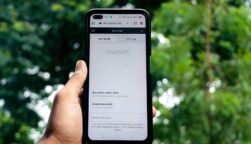In its very short history, ChatGPT has shaken up the tech industry by offering seemingly limitless opportunities to its 100 million-strong user base. The chatbot is capable of responding to prompts in a human-like manner — even picking up on humor and conversational nuances — pushing forward the frontier of artificial intelligence and separating it from similar tools of its kind.
Despite advancing competition from alternatives like Google Bard, the chatbot’s popularity is only expected to grow going forward. But who owns ChatGPT, how did it get to where it is today, and what relationship does billionaire and serial CEO, Elon Musk, have with the application? We discuss this, and much more, throughout this article.
Who Owns ChatGPT?
ChatGPT is owned by OpenAI, an AI research laboratory that was founded in 2015 by Sam Altman, Elon Musk, and other prominent figures including Peter Theil, Ilya Sutskever, Jessica Livingston, Reid Hoffman, Greg Brockman, Wojciech Zaremba, and John Schulman.
Sam Altman is the current sitting CEO of OpenAI and is understood to be the main contributor behind ChatGPT’s success.
 🔎 Want to browse the web privately? 🌎 Or appear as if you're in another country?
🔎 Want to browse the web privately? 🌎 Or appear as if you're in another country?
Get a huge 86% off Surfshark with this special tech.co offer.![]()
What is OpenAI?
OpenAI is a Silicon Valley-based company that started out its journey generating artificial intelligence for video games and other apps. The company has since switched its focus to general AI research and development, creating Chat Generative Pre-Trained Transformer (GPT) in 2018 — a unique language model that uses deep learning to produce human-like text — and more advanced models GPT-2, 3, and 4 in the years since.
OpenAI is also responsible for creating DALL-E, an AI system that generates realistic images from a language prompt, and Whisper, a speech recognition model that’s able to transcribe, identify, and translate 99 languages.
Does Elon Musk Own ChatGPT?
While Elon Musk co-founded ChatGPT and helped to financially back its mother company, OpenAI, in its early years, the ex-Twitter CEO doesn’t currently own stakes in the company.
Musk officially left OpenAI’s Board of Directors in 2018. In a Tweet the tech entrepreneur fired off in 2019, he cited a conflict of interest and prioritization of his other businesses, SpaceX and Tesla, as his primary reasons for distancing himself from the research company.
I had to focus on solving a painfully large number of engineering & manufacturing problems at Tesla (especially) & SpaceX
— Elon Musk (@elonmusk) February 17, 2019
However, a report from Semafor has since revealed that there may be a little more to the story.
According to several unnamed sources close to the matter, Musk tried to take over OpenAI because it had “fallen fatally behind Google”, only to be flat-out rejected by co-founder Greg Brockman and CEO Sam Altman.
After his proposal was jilted, Musk walked away from the company and cut all financial ties, despite promising to contribute $1 billion in funding over the course of several years. To recover these damages, OpenAI was forced to launch a “capped” for-profit model, that still runs alongside its non-profit entity to this day.
But after its explosive success, has Elon Musk’s opinions changed about ChatGPT? It doesn’t look like it. In March 2023, Musk and other leading tech figures like Apple Cofounder Steve Wozniak signed an open letter citing the dangers of rapidly developing AI like GPT-4, the language model powering ChatGPT.
However, despite his public concerns about AI, Musk has since claimed to be working on his own alternative to the AI chatbot, TruthGPT. In the Tesla CEO’s own words, TruthGPT aims to be the “maximum truth-seeking AI” and was set up to rival OpenAI’s “bias responses” and “politically correct” language model.
Musk has also been quick to criticize OpenAIs cozy relationship with Microsoft, claiming in a Tweet that the AI research lab is “effectively controlled” by the software provider. But how truthful are these assertions?
Does Microsoft Own ChatGPT?
Microsoft doesn’t own ChatGPT, nor the chatbot’s founding company OpenAI. However, the two companies have been partnered commercially since 2016, and Microsoft continues to be the company’s largest investor.
Microsoft invested $1 billion into the research lab in 2019, after the companies first made their partnership exclusive. Then, after the resounding successes of ChatGPT and OpenAIs’ other products, Microsoft invested a further $10 billion in the company this January, as they entered the third phase of their partnership.
OpenAI’s motivations are pretty obvious, but Microsoft also benefits heavily from this relationship. By investing in OpenAI, Microsoft is able to gain access to the lab’s cutting-edge technology, which it can then deploy across its broad range of products and services.
These heavy investments are paying off too. According to Business Insider, Microsoft’s Azure’s revenue is expected to jump 27% next quarter, compared to the last – with 1% of this growth being attributed to AI services.




